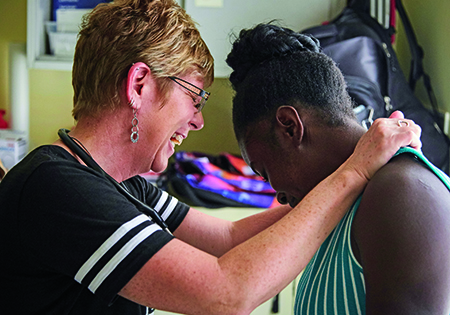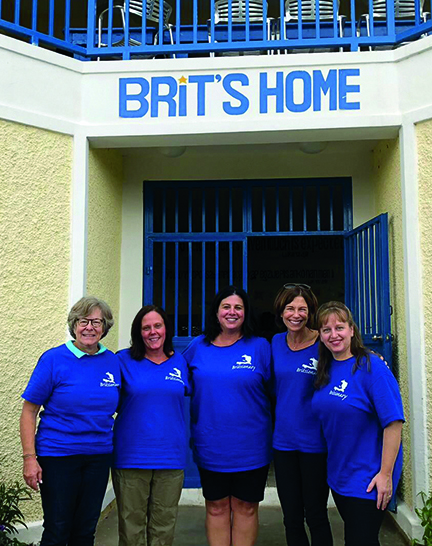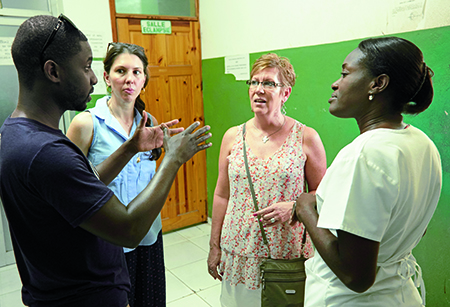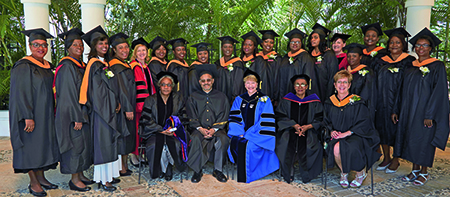
Above: Kellie LaPierre, DNP, GNP-BC, pictured with a patient at a Regis clinic in Haiti.
I often say stepping into Haiti is like stepping back in time. Despite traveling there more than a half dozen times, I’m still taken aback by its primitiveness. Resources that we never think twice about here in the United States, like electricity and clean water, are often sparse there. No surprise, since Haiti is the poorest country in the western hemisphere, where the average citizen eats just one meal every other day. Also extremely rare is accessible health care. Here in the U.S., if we don’t feel well, top-notch care is often just a phone call—or quick click—away. In Haiti, it’s starkly different. The nearest clinic could take days to reach by foot or hours by car. In many cases, clinics don’t provide medications like antibiotics. Instead, it’s up to the patients to bring their own (if they can afford it). Regis is looking to change that.
I’ve had the pleasure of traveling with the Regis College Haiti Project (RCHP) group on two occasions, most recently in February 2018. This is my travel diary.
Day 1: Bos>PAP>Grand Goave

Regis nursing team Susan Sawyer, Sheryl Kelleher, Lisa Krikorian, and Kimberly Campbell with Be Like Brit co-founder Cherylann Gengel (center) in front of the Brit’s Home orphanage in Grand-Goâve.
Haiti is only a four-hour flight from Boston, but as soon as the plane begins its descent over this impoverished country, it becomes immediately clear that you are in a different world.
Once we make our way through the congested (and chaotic), capital city of Port-au-Prince, we head to the Be Like Brit (BLB) orphanage located in the small, mountainous village of Grand Goave. The Gengel family of Rutland, Massachusetts, built BLB in memory of their daughter Britney, a 19-year-old college student who died in the massive earthquake in Haiti in 2010. BLB is now home to 66 children. The orphanage also houses a medical clinic, open to the public. Every week, individuals descend from the mountain, oftentimes with children in tow, to seek health care. Many have never seen a doctor or nurse before. Regis has partnered with BLB, and we meet up with two Regis assistant nursing professors, Lisa Krikorian and Sheryl Kelleher, who make two trips here each year. We witnessed the amazing work they are doing, treating individuals with conditions ranging from pneumonia to high blood pressure, which are easily treatable in the U.S. yet very often deadly in Haiti because of the lack of care. Demonstrating incredible compassion, and with the help of a translator, they examine and diagnose their patients one by one, administer the proper medications (all of which were donated), and talk to them about healthy habits that are like second nature to us yet foreign to them—like hand washing, which greatly helps control the spread of germs.
Day 2: Grand Goave>Les Cayes
Today we made our way to the southern town of Les Cayes, where we shot video interviews with two RCHP success stories. Since graduating from the program, Myrmonde Amazan has been promoted to the dean of students at the National Nursing School, and Rose Darline Bossuet is now the Head of Clinical Education there. In a country where women are still overpowered by men, particularly in the medical world, it’s great to see these two women in leadership positions. Upon meeting them, you immediately get the sense that their education has empowered them. During the interview, they confirm just that.
Day 3: Les Cayes>Port-au-Prince

Regis In Haiti team Harry Gerard, Alexis Lawton, and Kellie LaPierre meet with a graduate from the Regis Haiti Project, Rose Darline Boussuet (far right), at the regional hospital where she is responsible for all clinical education of nursing students in Les Cayes, Haiti.
We revisit Myrmonde and Rose Darline, who take us on a tour of the National Hospital in Les Cayes that is affiliated with the nursing school. An up- close look at the aging facility, which lacks even the most basic of “tools” like antibiotics and sterilization equipment, was eye-opening to say the least. All around us were patients lining the hallways, battling assorted ailments. Their suffering was evident. And silent. Haitians have a unique way about them when it comes to sickness. They don’t necessarily complain when they’re not feeling well or express when they’re in pain. Instead they appear to agonize inwardly, whether they’re in labor or near death from disease. I don’t know whether it’s toughness or surrender.
We left Les Cayes and headed back to Port-au-Prince to meet up with the rest of the Regis contingent, who flew in that day. This four-hour drive turned into an eight-hour extravaganza. But it’s hard to complain when you look out the window and are surrounded by unthinkable poverty. To say it puts everything in perspective is an understatement. That night we have dinner with Irma Bois, the head of nursing for the Ministry of Health and friend of the RCHP, and Fritz Des Hommes, Rector of the University of Haiti.
Day 4: Port-au-Prince: Ministry of Health / Notre Dame
In the morning, we head across town to the University of Haiti Nursing School in Port-au-Prince, where Medicine and Pharmacy is also located. The group meets with the dean of nursing and graduates of the RCHP to talk about the history of nursing in Haiti, the issues that still exist, and how Regis can be of further assistance. It’s safe to say that doctors (a male-dominated profession) are still more respected in Haiti than nurses (a female-dominated profession). I believe it’s because they have not yet evolved as a society. But it was clear the administrators had the utmost respect for the Regis contingent, perhaps because they realize the power and drive the group possesses to make a positive impact in their country.
Afterwards, we visit the University of Notre Dame d’Haiti, a private nursing school, and meet with the Rector. The group discusses with him the possibility of implementing the master’s program in his school. We also take a tour, where we peeked in on students in their classrooms. Looking at them, I thought about how the education they were fortunate enough to be receiving was ripe with opportunity. Opportunity for a better life. Opportunity for a stronger sense of self.
Day 5: Port-au-Prince>Mirebalais
With just one day before graduation, the soon-to-be graduates gathered at our hotel in Port-au-Prince to present their research projects to the RCHP group. Meanwhile, a few of us headed a few hours west to shoot video of the hospital in Mirebalais, a state-of-the-art facility built by the nonprofit Partners In Health (PIH)—and the first partner of the RCHP. Constructed in 2013, the hospital is truly a diamond in the rough. It treats close to one-thousand patients each day, many of whom travel across the country and wait hours, sometimes even days, to be seen. Despite this, the feeling of hope amongst these patients is palpable. The pews they sit on in the waiting room were donated by Boston churches, while some of the medical equipment used to sit inside Boston hospitals. Coming together to help those who need it most is what both PIH and Regis stand for.
Day 6: Port-au-Prince>Graduation Day

Graduates of the third cohort of the Regis Haiti Project celebrated graduation in Port-au-Prince in March 2018.
There’s excitement in the air as the third and final cohort of the RCHP receives their master’s degrees. The nurses travel in from all over the country with their beaming families in tow. The music they chose for their procession was a warrior march. It’s incredibly fitting, and aptly describes each of these women who have sacrificed, and against all odds, advanced their education. I got chills watching them receive their diplomas. With their heads held high, they looked confident, ready to take on any obstacle. Their mission is to help provide better medical care for the people of Haiti. Armed with their Regis degree, you get the feeling this is the first step in doing just that.
Regis In Haiti
Over the course of a decade, the goal of the Regis College Haiti Project (RCHP) has been to advance health care in Haiti by focusing on nursing education.
The program, now called Regis In Haiti, has awarded 37 master’s degrees in nursing and leadership to select nurse faculty throughout the impoverished country. Classes have taken place both in Haiti and on campus in Weston.
But there is still more work to be done. As the program moves into its next phase, the group has its sights set on three primary goals:
- Creation of an alumni program in Haiti to offer continued support and mentorship to the nurses, engage alumni, and ultimately raise the level of health care.
- Expand the partnership with the Be Like Brit orphanage (pictured below) to provide residents in the poverty-stricken village of Grand Goave with much-needed access to health care.
- The expansion of a Nurse Educator Program at the Partners In Health hospital in Mirebalais in order for nurses and nursing students to gain crucial hands-on experience to expand their skills.
Watch the video to learn more about what’s next for Regis In Haiti:
Regis In Haiti from Regis College on Vimeo.